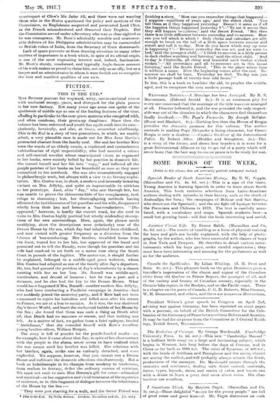FICTION.
THIS IS THE END.*
Miss BENSON pursues her wayward, .witty,, unconventional course with unabated energy, gusto, and disregard for the plain person in her new fantasy. Not many years ago some one spoke of the apotheosis- of middle age as one of the leading features of the time, alluding in particelar to the ever-green matrons who eompettek with, and often outshone, their grown-up daughters. Siece then the balance has been redressed and youth has again conie into its own— gloriously, heroically, and also, at times, somewhat rebelliously. This is the End is a story of two- generations, in which-, we readily admit, a very plausible case is made out for Miss Jane Martin's protracted absence from the family roof. She and her brother Kew were- the wards of an elderly cousin, a confirmed and cantankerous valetudinarian of rigid respectability, who had married a robust and self-centred novelist whose emancipated views, as expressed in her bookie, wore entirely- belied by her practice in domestic life. She turned herself and her life into "copy," and inflicted all the purple patches of her books on her household as soon as they were committed to her notebook. She was, also intermittently engaged in philanthropic work, but always with a view to its literary exploi- tation. Mrs. Gustus was, in short, a modern and intensely irritating variant on Mrs. Jollyby, and. quite as impenetrable to criticism as her-prototype. Jane, alias "Jay," who saw, througk her, but wee unable to pierce the rhinoceros-hide of her complaceney, took refuge. in shimming ; but, her thoroughgoing methods having affronted the fastidiousness of her guardian and his wife, disappeared wholly from their ken and became- a 'bas-conelnetress. " Dis- appeared," however, is hardly the correct word, for she used to write to Mrs. Gustus highly poetical but wholly misleading descrip- tions of her new surroundings. Here, again, the phrase needs modifying since the descriptions were (relatively) true of the Dream House by the sea, which Jay had inhabited from childhood, and now visited with greater frequency as a diversion from the theins of 'bus-eondueting. Her brother, invalided home. from the front, traced her to. her lair, but approved of the fraud and promised not to tell the Rustily, even though his guardian and his wife- had resolved to set forth on a, motor tour along the South Coast in pursuit of the fugitive. The motor-car, it should further be explained, belonged to a middle-aged grass widower, whom Mrs. Gustus had adopted as one of the family after Jay's departure. He, too, had guessed the problem of Jay's whereabouts by a, chance meeting with her on her 'bus. Mr. Russell was middle-aged, inarticulate, and devoid of humour ; but he was a. poet and a dreamer, and he also had the key to the Dream House. What would have happened if Mrs. Russell—another modern Mrs. Jellyby, who had been conducting a Pacificist campaign in America—had not suddenly joined the motoring party, and if. Kew had not been summoned to rejoin his battalion and killed soon after his return to France, we are at a loss to. sumnize. As it was, the war shattered Jay's Secret World, and burst theenchanted bubble of her House by the Sea ; she found that these. was such a thing as .Death after all, that Death had no romance or- reason, and that nothing was left. As is matter of fact, we gather from a brief epilogue, headed "Anticlimax," that she consoled herself with Kew's excellent young brother-officer, William Morgan.
The story is full of puzzles for the puzzle-headed reader—as, for example, how it came about that Jay, in spite of hor close contact with the people in the shuns, never seems to have realized what the war meant until'her brother was killed. Her relations with her brothen again, strike one as curiously detached, and even neglectful. We suppose, however, that you cannot- run a Dream House andeultieate the domestic affections simultaneously. But a. book so kaleidoscopic in its :changes from mockery to tenderness, from realism to fantasy, defies the ordinary canons of criticism. We must not omit to .note Miss Benson's gift for verse—whimsical and mystical—or her suggestive and vivid treatment of the mysteries of existence, as in this fragnsentof dialogue between the inhabitants of the House. by the Sea :— "They were just .starting, fora. walk, and. the Secret Friend was
• This is the Bud. By Stella Ilenaon. London: 31aemIllan and CO. VA. nets
finishing a dory. ' How can you remember things that happened— I suppose--squillions of years ago,' said the eldest child. ' You tell them as if they happened yesterday Doesn't it- seem as if all
the happiest things happened yesterday / To me it seems that they wall. happen to-morrow,' said the Secret Friend. 'But then there is so little difference between yesterday and to.morrow. How can you tell which is which ? Only clocks and calendars are silly enough to tread on the tail of a little space between sunrise and sunset and call it to-day. How do you know which way up thus is happening ? '—` Because yesterday the sun sot, and we went to bed,' said the youngest child.—' I think to-morrow is a little person in dark clothes watching and listening,' said the eldest child. And to-day is Cinderella, at shiny and beautiful instil twelve o'clock strikes.'—' All yesterdays and all to-morrows are in this house listening,' said the Secret Friend. ' This is the place where time is without a name. Here the beginning comes after the end. To- morrow we shall be born. Yesterday we died. To-day was just a little passage built of twenty-four odd hours.'"
In fine, this is a book to bewilder the old, to perplex the middle- aged, and to enrapture the very modern young.


























 Previous page
Previous page